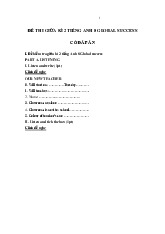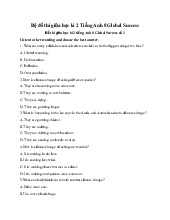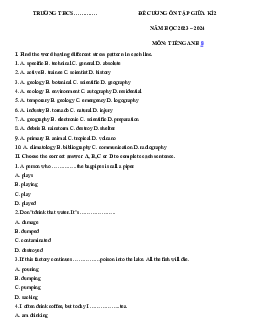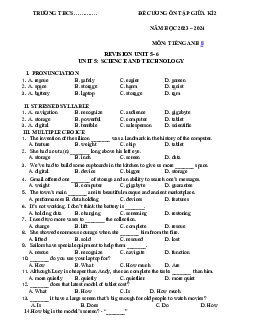









Preview text:
.......... SECONDARY SCHOOL
THE SECOND MID-TERM TEST SCHOOL YEAR: 2023-2024 Grade 8
Full name: ………………..........…… Time: 45 minutes Class: 8A … A. Phonetics
I. Choose the word whose underlined part is pronounced differently. 1. A. listened B. opened C. wanted D. lived 2. A. health B. team C. tea D. beach
II. Choose the word whose stress is different from the others. 3. A. national B. chemical C. informal D. medical 4. A. demography B. ecology C. biography D. futurology 5. A. Maltese B. festive C. degree D. unique
B. Vocabulary and Grammar
I. Choose the best answer
6. Air ........... , together with littering, is causing many problems in our cities today. A. pollute B. pollution C. polluting D. polluted
7. Many people in this city have received medical ……….. for the disease. A. support B. treatment C. help D. assistance
8. In the United States, there are 50
……. and six different time zones across the country. A. states B. nations C. towns D. countries
9. Australia is home ........ animals such as kangaroos and koalas. A. to B. in C. at D. on
10. A funnel-shaped storms passing overland below a thunderstorm is called a …………… A. typhoons B. tsunami C. tornado D. hurricane
11. There was ..... …… rain yesterday that several roads were flooded. A. too much B. so much C. too many D. so many
12. If we ………… more oil and coal, pollution will increase. A. use B. uses C. used D. had used
13. If I………. newspapers, I……… what was happening in the world. A. didn't read/ won't know B. don't read/ wouldn't know C. didn't read/ wouldn't know D. read/ wouldn't know1
14. The trains Ho Chi Minh City …………. at 9.15 every day. A. leave B. are leaving C. will leave D. left
15. Water pollution is the ……… in the lake which has made the fish die. A. contaminate
B. contaminated C. contamination D. contaminating
16. Has the damaged bridge ……… by the workers yet? A. be restored B. been restored
C. has been restored D. has restored
17. They ……………. the house for weeks. A. hadn’t cleaned B. hadn’t been cleaned C. hadn’t be cleaned D. hadn’t to be cleaned
II. Find out the mistakes
18. The earth is being threaten and the future looks bad. A B C D
19. If we don’t hurry up, we will be late to the concert. A B C D
20. Pollution is one of the most urgent problem in Vietnam. A B C D C. Reading:
I. Read the passage, choose the best answer. SAVE THE EARTH!
We are all slowly (21) ………the Earth. The seas and rivers are too dirty to swim in.
There is so much smoke in the air that it is unhealthy to live in many of the world’s cities. In
one well-known city, for example, poisonous gases (22) ……… cars pollute the air so much that
traffic policemen have to wear oxygen masks. We have cut down (23)………trees that there are
now vast areas of wasteland all over the world. As a result, farmers in parts of Africa cannot
grow enough (24)………In certain countries in Asia, there is too little rice. Moreover, we do not
take enough care of the countryside.
Wild animals are quickly disappearing. For instance, tigers are rare in India now because
we have killed too many of them. However, it isn’t enough simply to talk about the problem.
We must act now before it is too late to do (25)……… about it. Join us now. Save the Earth! 21. A. destroyed B. destroying C. destroys D. destroy 22. A by B. of C. from D. in 23. A. so many B. so few C. so little D. so much 24. A eating B. to eat C. for eat D. to be eaten 25. A. something B. nothing C. everything D. anything
II. Read the passage, answer the questions by choosing A, B, C or D.
There are more than 3,000 languages in the world today, but only about six are major
languages of the world. Two-thirds of the world’s populations speak those six languages. More
than 300,000,000 people speak English as their first or native language. No one knows how
many people speak it as a foreign language. Chinese is the only language with more speakers
than English. This is because of the huge population of China, more than one billion people.
English is the native or official language on one-fifth of the land area of the world. It is
spoken in North America, Great Britain, Australia and New Zealand. In South Africa and India,
it is one of the official languages.
More people study English than any other language. In many countries, the textbooks in
universities are in English. Many university classes are taught in English even though the native
language is not English. English is the language of international communication. It is the
language of international business, research, and science. More than three-fourths of the world’s
mails are written in English. More than three-fifths of the world’s radio stations use English.
More than half of the scientific and research journals are in English. Most other languages have borrowed many English words.
26. What language has the most speakers in the world?
A. The English has the most speakers in the world.
B. The Indian has the most speakers in the world.
C. The Chinese has the most speakers in the world.
D. The Australian has the most speakers in the world.
27. How many people speak English as a native or first language?
A. More than 200,000,000 people
B. More than 300,000,000 people
C. More than 500,000,000 people
D. More than 800,000,000 people
28. Are Chinese and Arabic probably major languages of the world?
A. Chinese is not one of the major languages of the world but Arabic probably is.
B. Chinese is one of the major languages of the world and Arabic probably is not.
C. Chinese is one of the major languages of the world but Arabic probably is.
D. Chinese is one of the major languages of the world but Arabic probably is not.
29. What percent of the world’s radio stations are in English?
A. More than three-fourth of the world’s radio stations use English.
B. More than three-five of the world’s radio stations use English.
C. More than three-fifths of the world’s radio stations use English.
D. More than three-fifth of the world’s radio stations use English.
30. Why do some countries use English textbooks even though English is not the native language?
A. More than half of the scientific and research journals are in English.
B. More than two half of the scientific and research journals are in English.
C. More than two halves of the scientific and research journals are in English.
D. More than halves of the scientific and research journals are in English. D. Writing
I. Choose the letter A, B, C or D to complete the sentences with given words.
31. Could/ you/ tell/ me/ what/ the symbol/ Scotland?
A. Could you tell to me what is the symbol of Scotland?
B. Could you tell to me what the symbol of Scotland is?
C. Could you tell me what is the symbol of Scotland?
D. Could you tell me what the symbol of Scotland is?
32. Fifty stars/ the/ United States’ flag/ represent/ fifty states
A. Fifty stars in the United States’ flag represents its fifty states.
B. Fifty stars at the United States’ flag represents its fifty states.
C. Fifty stars at the United States’ flag represent its fifty states.
D. Fifty stars in the United States’ flag represent its fifty states.
33. There/ many/ English/ speaking countries/ the world
A. There are many English speaking countries on the world.
B. There are many English speaking countries in the world.
C. There are many English speaking countries at the world.
D. There are many English speaking countries of the world.
34. A lot of/ people/ enjoy/ see/ ‘Titanic’/ despite/ sad ending.
A. A lot of people enjoy to see ‘Titanic’ despite its sad ending.
B. A lot of people enjoy to see ‘Titanic’ despite it has sad ending.
C. A lot of people enjoy seeing ‘Titanic’ despite it has sad ending.
D. A lot of people enjoy seeing ‘Titanic’ despite its sad ending.
35. What/ icon/ your/ country?
A. What is the icon of your country?
B. What is an icon of your country?
C. What is the icon to your country?
D. What is an icon to your country?
II. Rewrite the sentences without changing the meaning.
36. We haven’t got a calculator, so we can’t work this out quickly.
A. If we had a calculator, we could work this out quickly.
B. If we have a calculator, we could work this out quickly.
C. If we had had a calculator, we could work this out quickly.
D. If we have had a calculator, we could work this out quickly.
37. When did you start the project?
A. How long you started the project?
B. How long have you done the project?
C. How long did it start since you start the project?
D. How long have you started this project?
38. I'm often tired in the morning because I go to bed late.
A. If I didn’t go to bed late, I wouldn’t be often tired in the morning.
B. If I'm often tired in the morning, I will go to bed late.
C. I wouldn’t be often tired in the morning if I didn’t go to bed late. D. A and C are correct.
39. Martin may not be very well but he still manages to enjoy life.
A. Martin's poor health don’t prevent him (from) enjoying life.
B. Martin's poor health can't prevent him (from) enjoying life.
C. Martin's poor health not stop him (from) enjoying life.
D. Martin's poor health couldn’t prevent him (from) enjoying life.
40. Dumping solid wastes in rivers, lakes and oceans causes water pollution.
A. Dumping solid wastes leads to water pollution in rivers, lakes and oceans.
B. Dumping solid wastes lead to water pollution in rivers, lakes and oceans.
A. Dumping solid wastes led to water pollution in rivers, lakes and oceans.
A. Dumping solid wastes leading to water pollution in rivers, lakes and oceans. ----The end----
.......... SECONDARY SCHOOL ANSWER KEY FOR SCHOOL YEAR: 2023-2024
THE SECOND MID-TERM TEST Time: 45 minutes A. Phonetics
I. Choose the word whose underlined part is pronounced differently. 1. A. listened B. opened C. wanted D. lived 2. A. health B. team C. tea D. beach
II. Choose the word whose stress is different from the others. 3. A. national B. chemical D. informal C. medical 4. A. demography B. ecology C. biography D. futurology 5. A. Maltese B. festive C. degree D. unique
B. Vocabulary and Grammar
I. Choose the best answer
6. Air ........... , together with littering, is causing many problems in our cities today. A. pollute B. pollution C. polluting D. polluted
7. Many people in this city have received medical ……….. for the disease. A. support B. treatment C. help D. assistance
8. In the United States, there are 50 ……. and six different time zones across the country. A. states B. nations C. towns D. countries
9. Australia is home ........ animals such as kangaroos and koalas. A. to B. in C. at D. on
10. A funnel-shaped storms passing overland below a thunderstorm is called a …………… A. typhoons B. tsunami C. tornado D. hurricane
11. There was ..... …… rain yesterday that several roads were flooded. A. too much B. so much C. too many D. so many
12. If we ………… more oil and coal, pollution will increase. A. use B. uses C. used D. had used
13. If I………. newspapers, I……… what was happening in the world. A. didn't read/ won't know B. don't read/ wouldn't know
C. didn't read/ wouldn't know D. read/ wouldn't know1
14. The trains Ho Chi Minh City …………. at 9.15 every day. A. leave B. are leaving C. will leave D. left
15. Water pollution is the ……… in the lake which has made the fish die. A. contaminate B. contaminated
C. contamination D. contaminating
16. Has the damaged bridge ……… by the workers yet? A. be restored B. been restored
C. has been restored D. has restored
17. They ……………. the house for weeks. A. hadn’t cleaned B. hadn’t been cleaned C. hadn’t be cleaned D. hadn’t to be cleaned
II. Find out the mistakes
18. The earth is being threaten and the future looks bad. A B C D
19. If we don’t hurry up, we will be late to the concert. A B C D
20. Pollution is one of the most urgent problem in Vietnam. A B C D C. Reading:
I. Read the passage, choose the best answer. SAVE THE EARTH!
We are all slowly (21) ………the Earth. The seas and rivers are too dirty to swim in.
There is so much smoke in the air that it is unhealthy to live in many of the world’s cities. In
one well-known city, for example, poisonous gases (22) ……… cars pollute the air so much that
traffic policemen have to wear oxygen masks. We have cut down (23)………trees that there are
now vast areas of wasteland all over the world. As a result, farmers in parts of Africa cannot
grow enough (24)………In certain countries in Asia, there is too little rice. Moreover, we do not
take enough care of the countryside.
Wild animals are quickly disappearing. For instance, tigers are rare in India now because
we have killed too many of them. However, it isn’t enough simply to talk about the problem.
We must act now before it is too late to do (25)……… about it. Join us now. Save the Earth! 21. A. destroyed B. destroying C. destroys D. destroy 22. A by B. of C. from D. in 23. A. so many B. so few C. so little D. so much 24. A eating B. to eat C. for eat D. to be eaten 25. A. something B. nothing C. everything D. anything
II. Read the passage, answer the questions by choosing A, B, C or D.
There are more than 3,000 languages in the world today, but only about six are major
languages of the world. Two-thirds of the world’s populations speak those six languages. More
than 300,000,000 people speak English as their first or native language. No one knows how
many people speak it as a foreign language. Chinese is the only language with more speakers
than English. This is because of the huge population of China, more than one billion people.
English is the native or official language on one-fifth of the land area of the world. It is
spoken in North America, Great Britain, Australia and New Zealand. In South Africa and India,
it is one of the official languages.
More people study English than any other language. In many countries, the textbooks in
universities are in English. Many university classes are taught in English even though the native
language is not English. English is the language of international communication. It is the
language of international business, research, and science. More than three-fourths of the world’s
mails are written in English. More than three-fifths of the world’s radio stations use English.
More than half of the scientific and research journals are in English. Most other languages have borrowed many English words.
26. What language has the most speakers in the world?
A. The English has the most speakers in the world.
B. The Indian has the most speakers in the world.
C. The Chinese has the most speakers in the world.
D. The Australian has the most speakers in the world.
27. How many people speak English as a native or first language?
A. More than 200,000,000 people
B. More than 300,000,000 people
C. More than 500,000,000 people
D. More than 800,000,000 people
28. Are Chinese and Arabic probably major languages of the world?
A. Chinese is not one of the major languages of the world but Arabic probably is.
B. Chinese is one of the major languages of the world and Arabic probably is not.
C. Chinese is one of the major languages of the world but Arabic probably is.
D. Chinese is one of the major languages of the world but Arabic probably is not.
29. What percent of the world’s radio stations are in English?
A. More than three-fourth of the world’s radio stations use English.
B. More than three-five of the world’s radio stations use English.
C. More than three-fifths of the world’s radio stations use English.
D. More than three-fifth of the world’s radio stations use English.
30. Why do some countries use English textbooks even though English is not the native language?
A. More than half of the scientific and research journals are in English.
B. More than two half of the scientific and research journals are in English.
C. More than two halves of the scientific and research journals are in English.
D. More than halves of the scientific and research journals are in English. D. Writing
I. Choose the letter A, B, C or D to complete the sentences with given words.
31. Could/ you/ tell/ me/ what/ the symbol/ Scotland?
A. Could you tell to me what is the symbol of Scotland?
B. Could you tell to me what the symbol of Scotland is?
C. Could you tell me what is the symbol of Scotland?
D. Could you tell me what the symbol of Scotland is?
32. Fifty stars/ the/ United States’ flag/ represent/ fifty states
A. Fifty stars in the United States’ flag represents its fifty states.
B. Fifty stars at the United States’ flag represents its fifty states.
C. Fifty stars at the United States’ flag represent its fifty states.
D. Fifty stars in the United States’ flag represent its fifty states.
33. There/ many/ English/ speaking countries/ the world
A. There are many English speaking countries on the world.
B. There are many English speaking countries in the world.
C. There are many English speaking countries at the world.
D. There are many English speaking countries of the world.
34. A lot of/ people/ enjoy/ see/ ‘Titanic’/ despite/ sad ending.
A. A lot of people enjoy to see ‘Titanic’ despite its sad ending.
B. A lot of people enjoy to see ‘Titanic’ despite it has sad ending.
C. A lot of people enjoy seeing ‘Titanic’ despite it has sad ending.
D. A lot of people enjoy seeing ‘Titanic’ despite its sad ending.
35. What/ icon/ your/ country?
A. What is the icon of your country?
B. What is an icon of your country?
C. What is the icon to your country?
D. What is an icon to your country?
II. Rewrite the sentences without changing the meaning.
36. We haven’t got a calculator, so we can’t work this out quickly.
A. If we had a calculator, we could work this out quickly.
B. If we have a calculator, we could work this out quickly.
C. If we had had a calculator, we could work this out quickly.
D. If we have had a calculator, we could work this out quickly.
37. When did you start the project?
A. How long you started the project?
B. How long have you done the project?
C. How long did it start since you start the project?
D. How long have you started this project?
38. I'm often tired in the morning because I go to bed late.
A. If I didn’t go to bed late, I wouldn’t be often tired in the morning.
B. If I'm often tired in the morning, I will go to bed late.
C. I wouldn’t be often tired in the morning if I didn’t go to bed late.
D. A and C are correct.
39. Martin may not be very well but he still manages to enjoy life.
A. Martin's poor health don’t prevent him (from) enjoying life.
B. Martin's poor health can't prevent him (from) enjoying life.
C. Martin's poor health not stop him (from) enjoying life.
D. Martin's poor health couldn’t prevent him (from) enjoying life.
40. Dumping solid wastes in rivers, lakes and oceans causes water pollution.
A. Dumping solid wastes leads to water pollution in rivers, lakes and oceans.
B. Dumping solid wastes lead to water pollution in rivers, lakes and oceans.
A. Dumping solid wastes led to water pollution in rivers, lakes and oceans.
A. Dumping solid wastes leading to water pollution in rivers, lakes and oceans. ----The end----
Document Outline
- SAVE THE EARTH!
- SAVE THE EARTH!



